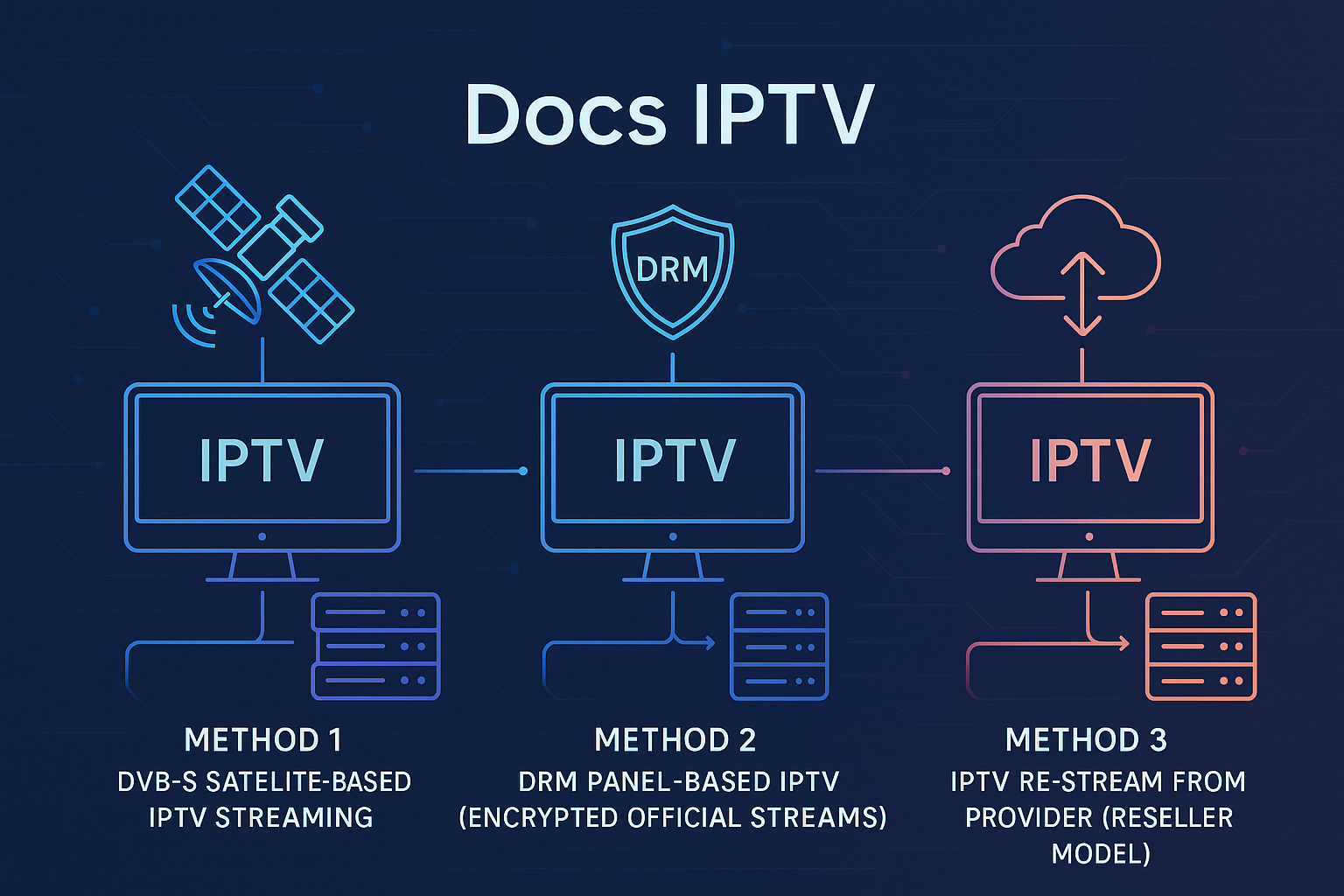Compare the 3 Most Powerful IPTV Streaming Methods: Which One Fits Your Business?

🚀 Compare the 3 Most Powerful IPTV Streaming Methods: Which One Fits Your Business?
Understanding the core IPTV delivery methods is essential for building a stable, secure, and scalable IPTV project. Whether you plan to operate a streaming platform using satellite hardware, encrypted DRM feeds, or reseller-based streams, this guide compares the top 3 IPTV methods in 2025 with insights, tools, and real-world applications.
🛰️ Method 1: DVB-S Satellite-Based IPTV Streaming
🔍 Overview
This method captures TV signals directly from a satellite dish using a DVB-S or DVB-S2 tuner card. It’s the most advanced and hardware-based approach, used by professionals and content aggregators.
🔁 Workflow
- Capture MPEG-TS via DVB-S2 tuner
- Optional transcoding to reduce bitrate
- Package to HLS/MPEG-DASH format
- Restream to end-users
🧰 Requirements
- Satellite Dish + LNB
- DVB-S/DVB-S2 tuner card (e.g., TBS)
- High-performance Linux server with strong CPU/GPU
- IPTV processing tools:
✅ Advantages
- Total control over content source
- 100% legal if FTA or licensed decryption
- Broadcast-grade signal quality
❌ Drawbacks
- Expensive hardware setup
- High CPU/GPU resource usage
- Not suitable for beginners
Keywords: dvb-s iptv, satellite streaming, flussonic dvb-s2, iptv tuner linux, broadcast to HLS IPTV
🔐 Method 2: DRM Panel-Based IPTV (Encrypted Official Streams)
🔍 Overview
With this method, you use a DRM panel like O11 to extract encrypted streams from legal sources (e.g., Sky, Ziggo, etc.) and redistribute securely via DRM tokens (Widevine, Playready).
🔁 Workflow
- Subscription from provider
- Use DRM script to extract stream
- Secure delivery using DRM standards
- Restream using your IPTV panel
🧰 Requirements
- DRM-capable software and scripts:
- Widevine or Playready license keys
- Proxy or residential proxy setup (geo-blocked sources)
✅ Advantages
- No transcoding required
- High-quality, multi-language streams
- Minimal hardware needed (can run on VPS)
❌ Drawbacks
- Constantly changing DRM scripts
- Potential legal gray area
- Proxy setup can complicate deployments
Keywords: o11 drm iptv, widevine xtream codes, encrypted iptv streaming, legal iptv drm, xui drm integration
🌐 Method 3: IPTV Re-Stream from Provider (Reseller Model)
🔍 Overview
This is the most popular method for new IPTV startups. It involves purchasing M3U or Xtream Code lines from another IPTV provider and restreaming them to your own users.
🔁 Workflow
- Get access from reseller or wholesaler
- Use Xtream API or M3U to import content
- Stream directly to clients via your panel
🧰 Requirements
- A reliable IPTV source
- Basic Linux VPS or dedicated server
- IPTV Middleware (e.g., XUI.one, Xtream UI)
✅ Advantages
- Fast deployment and low entry cost
- Beginner-friendly
- No special scripts or licensing
❌ Drawbacks
- Poor uptime if provider fails
- No source control or ownership
- May lead to unstable user experience
Keywords: iptv reseller startup, restream m3u xtream, easy iptv business, xtream panel setup, iptv panel xui
📊 Side-by-Side Comparison
| Feature | DVB-S Satellite | DRM Panel Streams | IPTV Re-Stream |
|---|---|---|---|
| Hardware Needed | ✅ Yes | ❌ No | ❌ No |
| Legal Use (if Licensed) | ✅ Yes | ❓ Maybe | ❓ Maybe |
| Beginner-Friendly | ❌ No | ❌ No | ✅ Yes |
| Server Resource Intensity | 🔥 High | 🧊 Low | 🧊 Low |
| Uptime Control | ✅ Full | ⚠️ Partial | ❌ None |
| Startup Cost | 💰 High | 💸 Medium | 🟢 Low |
Whichever method you choose, always start with a secure server base. Read our Linux Hardening Guide to block brute force attacks, filter bad traffic, and keep your IPTV business stable.
